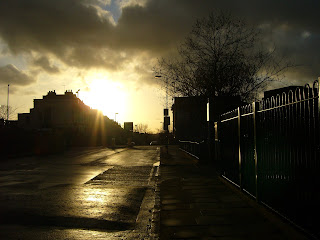
Hay costumbres británicas que ni comprendo ni comparto, aunque existen otras que resultan bastante lógicas, razonables, incluso hasta graciosas. Cuestionarlas es natural cuando sientes que no te pertenecen, que no son las tuyas propias, aunque a veces resulta sorprendente descubrirte practicándolas de manera inconsciente.
Esta mañana, bajo la lluvia que nos lleva acompañando estas últimas semanas, he vuelto a hablar del tiempo. Ya no recuerdo cuántas veces lo he citado, apuntado, referido, comentado, diagnosticado o previsto últimamente, pero hoy había decidido no hacerlo, sólo por comprobar la consistencia de una de las principales costumbres anglosajonas. Y no lo he conseguido.
El caso fue que nada más llegar a mi trabajo, mientras colocaba unas mesas a la puerta del café, una señora mayor que caminaba por la acera abrazada a su paraguas, me mira y me comenta sonriente al verme: - "¿Eres una persona optimista, verdad?". Yo no dije nada, aunque sé que mi cara lo dijo todo.
(The Weather)
There are some British habits that I do not understand, but others turn out to be logic, reasonable, even funny. Question them is a natural response when you feel that they don´t belong to you, that they are not yours, although sometimes it´s surprising to discover ourselves practising them in an unconscious way.
This morning, under the same rain of these last weeks, I´ve talked again about the weather. I can´t remember how many times I have quoted, pointed, referred, commented, diagnosed or foreseen recently, but today I had decided not to do it, only to check the consistency of one of the main English traditions. I couldn´t get it.
The thing was that I just arrived at my workplace, while I was laying-out tables and chairs outside the local, an old lady that was walking through the pavement embraced to her umbrella, looked at me and told with a smile in her face and the rain falling over his head: - "Are you an optimistic, aren´t you?" I didn´t say a word, but I know my face said all.



